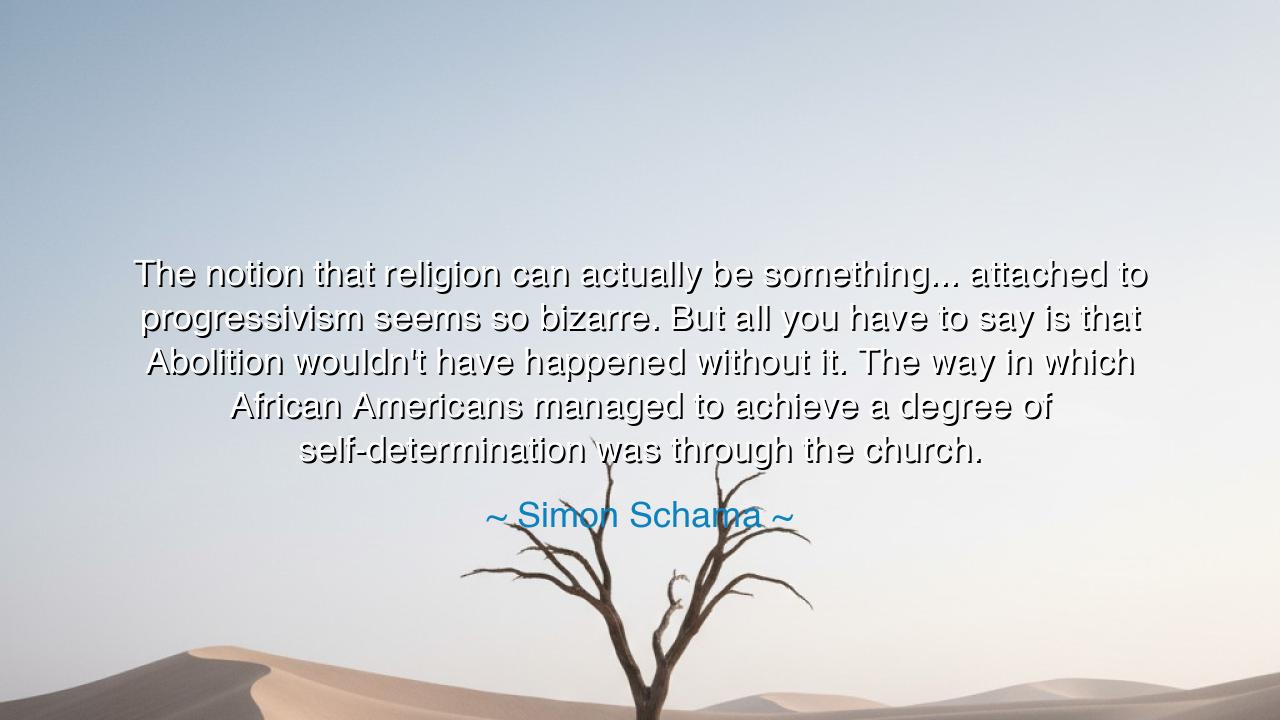
The notion that religion can actually be something... attached to
The notion that religion can actually be something... attached to progressivism seems so bizarre. But all you have to say is that Abolition wouldn't have happened without it. The way in which African Americans managed to achieve a degree of self-determination was through the church.






"The notion that religion can actually be something... attached to progressivism seems so bizarre. But all you have to say is that Abolition wouldn't have happened without it. The way in which African Americans managed to achieve a degree of self-determination was through the church." These words by Simon Schama invite us to reconsider the relationship between religion and progressivism, two forces often perceived to be in conflict. At first glance, the very idea of religion serving as a driving force for social change may seem counterintuitive, for religion has historically been associated with tradition and stability rather than revolution. Yet Schama's statement forces us to reflect on the power religion can have when it becomes a catalyst for freedom and justice—as it did in the abolition of slavery.
In the case of Abolition, religion did not merely exist as a backdrop, something separate from the struggle for freedom. It was woven into the very fabric of the movement, a source of strength, hope, and mobilization. The church was not only a spiritual sanctuary for the enslaved and oppressed, but a site of resistance, a place where African Americans found solidarity and a voice to demand freedom. Christianity, deeply embedded in the culture of African American communities, became the language through which the quest for liberation was articulated. The church was both a shield against the dehumanization of slavery and a sword cutting through the chains of oppression.
Let us turn to the example of Harriet Tubman, a name that has echoed through history as a symbol of courage and resilience. Tubman, herself a deeply devout Christian, believed that God had called her to lead enslaved people to freedom. The church provided her not only with spiritual nourishment but the moral fortitude to risk her life again and again, guiding hundreds to freedom through the Underground Railroad. Her faith, like that of many abolitionists, was not passive; it was a force—a driving force of liberation. She spoke often of her belief in divine guidance, and in her case, religion transcended the confines of a purely personal devotion; it became a powerful tool for social transformation.
The Black church played a pivotal role in organizing and uniting communities, offering a sense of collective identity and purpose. When enslaved African Americans were denied basic rights, the church was the one place where they could organize, speak freely, and resist the dominant power structure. In these hallowed spaces, the preaching of freedom, dignity, and self-determination resonated. The spirituals, those deeply emotional songs of sorrow and hope, became more than just expressions of grief; they were powerful songs of resistance, a collective cry for justice that echoed through the generations.
Even as religion provided the foundation for the abolitionist movement, we must understand that it was not a force of change on its own; it was the people who, inspired by their faith, worked tirelessly to make that change a reality. Frederick Douglass, an escaped slave and prominent abolitionist, often spoke of the ways in which his Christian faith motivated him to fight for justice. He rejected the notion of a slave-holding religion, but he believed that a true understanding of Christianity would lead to the emancipation of all people. It was through the moral teachings of the faith that he found the courage to challenge the injustices of the world and to demand a society built on equality and freedom.
From these historical examples, we learn that religion, when intertwined with the desire for justice, can indeed be a progressive force. The church did not simply comfort those who suffered under the weight of slavery—it inspired them to take action. It gave them the courage to resist, to organize, and to fight for a world where the chains of oppression could be broken. Religion was not the enemy of progressivism; it was the fuel that kept the flame of freedom burning in the hearts of the oppressed.
The lesson for us today is clear: faith, in its truest form, is not meant to keep us passive or complacent. It is meant to inspire action, to challenge the status quo, and to fight for justice. When faced with oppression, when confronted with inequality, the church—or any community of faith—has the power to be a powerful source of change. We are reminded that religion, when aligned with the pursuit of justice, can be the spark that ignites a movement for the common good. As we reflect on this wisdom, let us not separate faith from action, but let it guide us toward a world where freedom, equality, and dignity are the birthright of all. Let us take inspiration from the past, where religion and progressivism worked hand in hand to achieve what seemed impossible, and let that inspire our own struggles for justice today.






AAdministratorAdministrator
Welcome, honored guests. Please leave a comment, we will respond soon